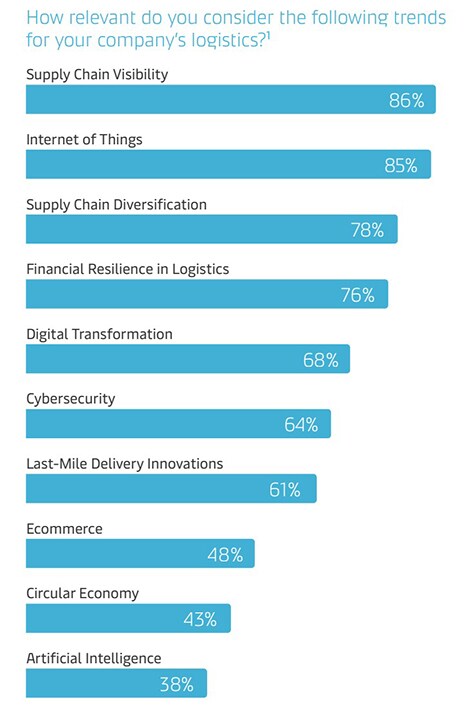Copenhagen – Tariffs, political tensions and conflicts, inflation and recession risks, changing consumer behaviour or underlying challenges like digitisation and AI: Most businesses globally are faced with unseen levels of unpredictability and uncertainty at the moment.
Navigating this complex environment and taking the right focus and decisions has become more difficult than ever across virtually all industries. When it comes to global supply chains Maersk’s new Logistics Trend Map helps now to focus on the most relevant trends and game changers for future supply chain management.
The report is based on comprehensive data analysis by the partner Statista as well as quality expert interviews and insights from more than 500 industry logistics leaders. To identify the trends, we have used AI-driven analytics to explore scientific studies, patents, earnings calls, and startup activities. With the objective of not only identifying the most important trends but also positioning them on the Trend Map, we assessed the data to determine the relevance and level of industry adoption of each trend.
From a list of 30 identified areas The Logistics Trend Map offers deep-dives into the ten most relevant topics such as Supply Chain Visibility, Internet of Things, Supply Chain Diversification, Financial Resilience, Circular Economy, AI, Cyber Security or the latest innovations in E-Commerce and Last-Mile Delivery.

Source: Survey among 570 global logistics decision-makers across various industries conducted by Statista on behalf of Maersk (Q4/2024)
These ten top rated topics and their impact on supply chain management vary significantly across the geographical regions and eight industry verticals (retail, automotive, chemicals, pharma & healthcare, lifestyle & fashion, perishables, technology and FMCG). Filtering the topics by region and industry vertical offers some surprising results: For instance, in retail the reverse logistics/return handling is by far the most pressing challenge for company logistics, said 53% of the interviewed decision-makers (mainly due to its complexity) – even bigger than geopolitical disruptions which were mentioned only by a comparatively low 38% in retail (versus max of 59% in fashion & lifestyle and pharma & healthcare).
In an increasingly complex and challenging world, staying ahead in logistics has never been more critical. The question is no longer whether companies will face disruption in their supply chains, but how they can constantly and effectively navigate them. Identifying and analysing trends therefore enables businesses to stay competitive in a dynamic industry.
The Logistics Trend Map offers also actionable insights on how to leverage the trends to solve problems and unlock growth opportunities.
The Logistics Trend Map can be found and filtered by theme, industry and region here while the full 70 page report is available for download here.
关于马士基
A.P. 穆勒 - 马士基集团是一家综合性物流公司,致力于连接和简化其客户的供应链。作为全球物流服务领导者,公司业务覆盖 130 多个国家,员工人数约为 100,000 人。马士基的目标是通过新技术、新船舶和绿色燃料,到 2040 年实现整个业务的净零排放。
For further information, please contact:
无论您需要什么,我们都可以随时为您提供帮助
I agree to receive logistics related news and marketing updates by email, phone, messaging services (e.g. WhatsApp) and other digital platforms, including but not limited to social media (e.g., LinkedIn) from A. P. Moller-Maersk and its affiliated companies (see latest company overview). I understand that I can opt out of such Maersk communications at any time by clicking the unsubscribe link. To see how we use your personal data, please read our Privacy Notification.
By completing this form, you confirm that you agree to the use of your personal data by Maersk as described in our Privacy Notification.

